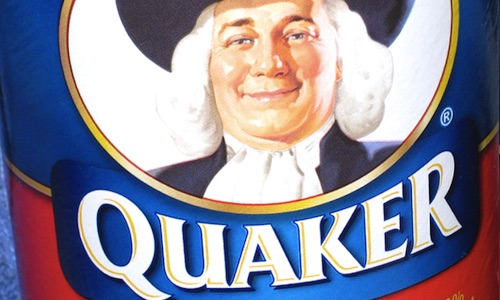
Quaker Oats Accused of Being ‘Deceptive and Misleading’ After Glyphosate Detected in Oatmeal

PepsiCo Inc.’s Quaker Oats has been accused of false advertising by a group of consumers in New York, California and Illinois, who have filed a class action lawsuit challenging the company’s claim of being “100 Percent Natural” despite having traces of the weedkiller glyphosate found in its famous oatmeal.
According to the complaint, glyphosate allegedly made its way into Quaker Oats “not simply because it is used as an agricultural weed killer, but because it is sprayed on the oats as a drying agent shortly before harvest.”
The plaintiffs, who are seeking refunds from PepsiCo., are not accusing Quaker of illegally using glyphosate but that its “100 Percent Natural” claim is “false, deceptive and misleading” since it contains the controversial chemical.
Glyphosate, the main ingredient in Monsanto’s flagship herbicide Roundup, was declared a probable carcinogen by the World Health Organization’s International Agency for Research on Cancer (IARC) last year.
“Quaker knows that consumers seek out and wish to purchase whole, natural foods that do not contain chemicals, and that consumers will pay more for foods that they believe to be natural,” the court document states.
Bloomberg noted that in 1997, “Quaker Oats oatmeal became the first food product to be allowed by the Food and Drug Administration to carry the claim that it was healthy, according to a study that examined the marketing of health foods.”
Quaker advertises its popular whole grain oats for its “wholesome goodness.” However, as the complaint states:
No reasonable consumer, seeing these representations, would expect Quaker Oats to contain anything unnatural, or anything other than whole, rolled oats.
Quaker Oats, despite their labels, do contain something other than whole, rolled oats; namely, Quaker Oats contain glyphosate.
Glyphosate is not “Natural” or “100 Percent Natural.” Glyphosate is a synthetic biocide and probable human carcinogen, with additional health dangers rapidly becoming known.
Quaker issued a defense to the New York Times, stating, “Any levels of glyphosate that may remain are trace amounts and significantly below any limits which have been set by the EPA as safe for human consumption.”
The New York Times reported that in a test paid for by lawyers for the plaintiffs, the Richman Law Group, glyphosate was detected at a level of 1.18 parts per million in a sample of Quaker Oats Quick 1-Minute, or 4 percent of the 30 parts per million that the U.S. Environmental Protection Agency (EPA) allows in cereal grains.
Glyphosate is the most widely used agricultural herbicide in the world. Farmers sprayed 2.6 billion pounds of Monsanto’s glyphosate herbicide on U.S. agricultural land between 1992 and 2012, according to the U.S. Geological Survey.
The chemical has been detected in several products, from alcoholic beverages and even women’s hygiene products. Last month, the Alliance for Natural Health-USA released the results of food safety testing conducted on an assortment of popular breakfast foods, revealing that glyphosate was found in 10 of the 24 food samples tested, including oatmeal, bagels, eggs (including the organic variety), potatoes and even non-GMO soy coffee creamer.
Monsanto has vehemently denied the cancer claims of its blockbuster product and has demanded a retraction of the IARC report.
“Regulatory agencies have reviewed all the key studies examined by IARC—and many more—and arrived at the overwhelming consensus that glyphosate poses no unreasonable risks to humans or the environment when used according to label instructions,” the company states on its website.
For instance, in November, the European Food Safety Authority rejected the IARC’s classification of glyphosate as a possible carcinogen, declaring that the ingredient is “unlikely to pose a carcinogenic hazard to humans.”
And on Friday, the EPA published a report online that concluded glyphosate is not likely to be carcinogenic to humans.
However, the document was pulled on Monday. According to Reuters, the agency said that the document was inadvertently published and it had not finished the review of the chemical.
Oops says @EPA Glyphosate cancer assessment not actually done yet @MonsantoCo documents were "inadvertently posted" but now taken back
— carey gillam ✍️ 📓 (@careygillam) May 2, 2016
Unsurprisingly, Monsanto is pleased with the release of the document, telling Reuters after the documents had been removed that they were “clearly labeled and signed as the final report of EPA’s Cancer Assessment Review Committee.”
Monsanto’s chief technology officer Robb Fraley tweeted, “EPA declares (again) that glyphosate, the active ingredient in Roundup, is not a carcinogen.”
He added, “This is the EPA’s highest ranking for product safety—they also do nice job of explaining all of IARC’s mistakes.”
https://twitter.com/MonsantoCo/status/727286585805393920
The Center for Biological Diversity, however, has issued a statement accusing the EPA of relying heavily on “industry-funded studies that have not undergone public scrutiny” for its draft analysis whereas the IARC used publicly available research for its own study. The nonprofit conservation organization also pointed out that the IARC took into account studies on actual products that are available on store shelves, while the EPA ignored those studies to focus solely on studies that tested glyphosate as a single ingredient.
“EPA’s determination that glyphosate is non-carcinogenic is disappointing, but not terribly surprising—industry has been manipulating this process for years,” Nathan Donley, a scientist with the Center for Biological Diversity, said. “The analysis done by the World Health Organization is more open and transparent and remains the gold standard.”
A lawyer representing the New York consumers in the Quaker Oats lawsuit told Bloomberg that the contrary opinions from government agencies will not affect the suit because their complaint centers on advertising claims rather than the levels of the herbicide in Quaker Oats.
Monsanto is facing a growing number of lawsuits over its widely popular product, including a wrongful death lawsuit filed in March by the widow of a Cambria, California farmer alleging that the St. Louis-based company had known for years that exposure to glyphosate could cause cancer and other serious illnesses or injuries.

 233k
233k  41k
41k  Subscribe
Subscribe 